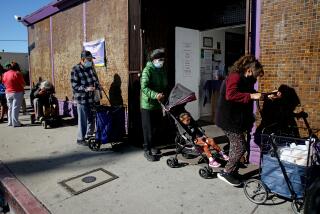Partnership seeks help for homeless youths
- Share via
Nearly a third of young people living on the streets of Hollywood say they have encountered major hurdles trying to put a roof over their heads, according to a new study that urges policy-makers to invest in services for homeless youth.
“It’s money now or it’s money later,” said Arlene Schneir, associate director of the Division of Adolescent Medicine at Children’s Hospital Los Angeles and co-chairwoman of the Hollywood Homeless Youth Partnership.
Members of the partnership, which produced the study released Wednesday, said young people need housing options that are stable, supportive and appropriate to their level of development. But researchers found that homeless youths face high rents, long waits and cumbersome applications for the few housing programs available to them, and if they do get a spot, there are stiff penalties for breaking the rules.
The eight service organizations belonging to the partnership acknowledge that expanding resources now may be challenging. They are competing for scarce dollars at a time when demand for assistance is growing because of the poor economy. But they say the investment will pay off if young people don’t become chronically homeless, joining a population that makes heavy use of hospital emergency rooms, the criminal justice system and other expensive services.
At least 4,200 people under age 25 are homeless on any given night in Los Angeles County, according to a 2009 count conducted by the Los Angeles Homeless Services Authority.
Jevon Wilkes, a 21-year-old communications major at Cal State Channel Islands, landed on the streets at 14 after clashing with his grandmother. For months, he slept on the pavement in front of her downtown apartment building. The hardest part, he said, was the cold.
His life turned around when school officials discovered he was homeless and referred him to the Los Angeles Youth Network. The organization offered him a bed in an emergency shelter, then found him a place in a group home.
“I had angels in the City of Angels,” Wilkes said.
Hollywood is a magnet for homeless youth, who tend to avoid the intimidating streets of skid row. In the winter and spring of 2007, researchers surveyed 389 youths in residential programs, shelters, drop-in centers and on the streets. The next year, they conducted 53 in-depth interviews and 19 focus groups with young homeless people.
The study found that most of the homeless youths in Hollywood were men between the ages of 18 and 25. About a quarter were minors, 32% were females and 5% identified themselves as transgender.
About 40% reported their sexual orientation as gay, lesbian, bisexual or questioning, compared to 10% or less of the general population.
When asked about race, 42% said they were African American and 24% Latino. That is a shift from the early 1990s, when more than half the homeless youths in Hollywood identified themselves as white.
Service providers in the neighborhood say they have been seeing more African American youths from South Los Angeles and fewer whites from outside the county than in previous decades.
The average age at which these young people leave their homes is 14. The study identified two main reasons: family breakdowns and failures in the system designed to provide a safety net for young people.
Of those surveyed, 78% listed family reasons: a parent in jail, physical or sexual abuse, heavy drinking or drug use. Nearly half had interacted with child protective agencies, and 69% had a history with the juvenile or criminal justice systems.
The report praised county officials, business leaders, faith-based and community organizations for developing innovative solutions for the chronically homeless. But it said programs and policies aimed at adults need to be adapted for young people.
It recommended funding a variety of housing options, saying some young people need the structure and support offered by transitional living arrangements, while others need more flexibility as they overcome substance abuse and mental health problems.
In addition to housing, the report said more services were needed to help homeless youths connect to caring adults, build life skills, complete their education and find jobs. It also said better strategies were needed to prevent young people from entering the foster care and juvenile justice systems and to prepare them for independence when they leave.
The report urged public and private agencies to coordinate their programs, to include homeless youths in decision making and to lobby for a greater share of federal funding.
“This is not an insurmountable and intractable problem,” said Los Angeles County Supervisor Zev Yaroslavsky, who attended a meeting to discuss the report’s findings. “All we need to do is put our minds to it.”
More to Read
Sign up for Essential California
The most important California stories and recommendations in your inbox every morning.
You may occasionally receive promotional content from the Los Angeles Times.










